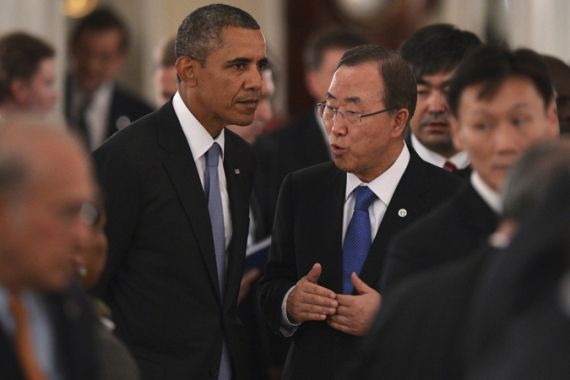Brahimi says Syria strikes need UN approval
UN-Arab League envoy says it would be illegal to bypass Security Council, as debate rages on possible military action.

Lakhdar Brahimi, the joint United Nations-Arab League envoy to Syria, has said that no state can “take the law into their own hands” and conduct military action against Syria without prior UN Security Council approval.
Brahimi was speaking on the sidelines of the G20 summit in St Petersburg on Friday, after meetings with foreign ministers including Russia’s Sergei Lavrov, who said many nations realise that striking Syria without Security Council backing would scuttle the chances of reaching a political solution.
Lavrov said that “a clear understanding is taking shape among many responsible states that the use of force, bypassing the Security Council, would essentially put an end to efforts to reach a political settlement and convene an international conference”.
The remarks came as leaders at the summit continue to be sharply divided on the issue of whether to conduct military strikes against Syria after the alleged use of chemical weapons in Damascus suburbs by Syrian regime forces on August 21.
The two-day summit was overshadowed by the conflict, as US President Barack Obama tried to garner international support for the military campaign amid Russian opposition.
Russia and China, both veto-wielding members of the Security Council, have expressed concerns over the evidence so far provided by the US and others suggesting that the attack was carried out by the Syrian regime.
‘Unprecedented’ human crisis
The push towards military action has been slowing in recent days, and on Friday UN Secretary-General Ban Ki-moon made a fresh plea against it, warning that it could spark further sectarian violence in a country already suffering from a humanitarian crisis “unprecedented” in recent history.
Speaking at a humanitarian meeting hosted by Britain on the sidelines of the summit, Ban pointed to the need to “avoid further militarisation of the conflict and revitalise the search for a political settlement instead”.
In earlier comments, Ban told G20 leaders that while “we cannot allow impunity in any crime against humanity […] providing more arms to either side is not the answer”.
“There is no military solution,” he said.
More than 100,000 people have been killed in the conflict, and the UN refugee agency says about one third of Syria’s pre-war population of 20.8 million have fled their homes, either to other countries or safer areas within Syria.
Ban’s comments, and Russia’s repeated calls for further evidence of the chemical weapons attack to be provided to the Security Council, came as EU defence ministers concluded that the Syrian government was responsible for the August 21 strike.
“There are many signs that the regime used the [chemical] weapons,” Lithuanian Defence Minister Juozas Olekas said as EU ministers met in the Baltic state, which currently holds EU’s rotating presidency.
Olekas said that although all his fellow ministers “condemned the use of chemical weapons and believed those responsible must be held accountable” there were “a variety of opinions” on what should be done in response.
US embassy closures
Even as EU ministers discussed the issue of strikes, four Russian naval ships were on their way to the eastern Mediterranean sea, the Russian Interfax news agency reported.
Kremlin chief of staff Sergei Ivanov said on Thursday that Russia was boosting its naval presence in the Mediterranean Sea, but primarily in order to organise a possible evacuation of Russians from Syria. He did not say how many vessels were being sent.
The US already has numerous war ships in the Mediterranean.
As tension in the region mounts, the US on Friday warned its citizens against all travel to Lebanon, and also announced that it was evacuating “non-emergency personnel” from its embassy in Beirut.
It announced similar measures for its consulate in the southeastern Turkish city of Adana.